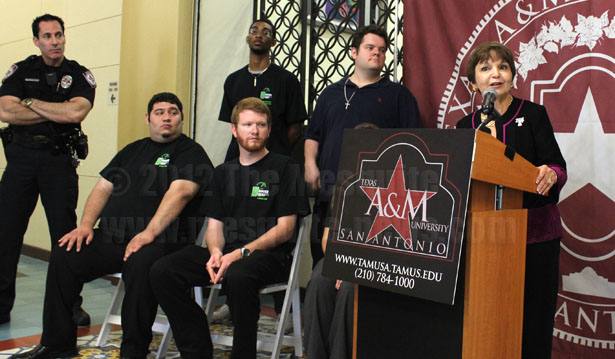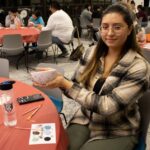
Story and photo by Melody Mendoza
Texas A&M-San Antonio will be the second university in San Antonio to develop and promote U in the Driver Seat, a peer-to-peer safe driving program, where students seek to reverse the trend of alcohol-related crashes.
The University and the University of the Incarnate Word have launched the U in the Driver Seat program. Organizers hope the program will eventually spread statewide, according to a University press release.
The program is based on Teens in the Driver Seat, which began 10 years ago by Texas Transportation Institute, a member of the A&M System.
In President Maria Hernandez Ferrier’s opening remarks at a press conference Sept. 27, she showed how this program hit home last week when two students, Jimmy and Regina Maspero, were involved in a car crash.
The San Antonio Express-News reported that the Masperos were driving with their family on Sept. 19 when they were involved in a deadly car accident that claimed the lives of two of their small children. Read related article
Although Ferrier said she knew this program would be important for the safety of students, she said, “I did not foresee, however, that two of our students would be critically injured in a terrible car crash just a week ago that would suffer the ultimate loss of their two children.”
With the Maspero family in her thoughts, Ferrier said the launch of this safe driving program will “bring it home in a very personal way for this University.”
Ferrier was joined Sept. 27 in the foyer of Main Campus Building with students from A&M-San Antonio and University of the Incarnate Word.
“U in the Driver Seat represents a ray of hope in the face of a serious threat to our lives and our safety,” Ferrier said.
Russell H. Hank, the teen program director, said based on the success of the high school program, there was a need to replicate the program at the college level. The high-school-level program has been implemented in more than 500 schools in Texas.
U in the Driver Seat was piloted in San Antonio when the institute received a grant to implement the program at two universities.
He said the center will offer this University and UIW resources like t-shirts, Koozies, air fresheners and access to the U in the Driver Seat website, where students can download posters.
Eva Mullen, Jaguar Ambassador and social science senior, and Samantha Buentello, a representative and program leader from UIW, spoke on behalf of their student bodies in support of the program.
“We are here to announce our commitment to reversing a serious and deadly trend,” Mullen said.
She noted an array of statistics: Car crashes are the No. 1 killer of Americans under the age of 25; alcohol being the most common contributors to these crashes. Across Texas in 2011, drivers under the age of 25 were responsible for 21 percent of all alcohol-related fatal crashes.
Buentello said, “We know that any message is going to mean a lot more if it comes from a person our age. That’s what makes this program work.”
She said at UIW, Student Government Association and leaders of the sororities and fraternities are getting involved in the effort to reduce drunken driving.
“We’re using peer pressure to save lives,” she said.
Although only a few students stopped to listen to the speakers as they made their way to class, some students at Main Campus chimed in on the program.
Education juniors Natalie Kramer and Kayla Rains said they think the peer-to-peer effort will be effective.
“I think you’re more apt to listen to your friends than to your mom or teacher,” Kramer said. “You take it more to heart.”
Kinesiology senior Josh Roth and kinesiology graduate Christopher Bratton were a little more hesitant.
Roth said the program might work for some, adding it depends on their mindset. He said older students either already know not to drink and drive or are set in their ways and won’t be influenced even by their peers.
On the other hand, he said a young student here who just turned 21 is more susceptible to peer influences.
Bratton noted that both men are in the military, which is their main influence not to drink and drive because there are bigger consequences for them.
“More buddies of mine have died from car crashes than combat,” he said.





